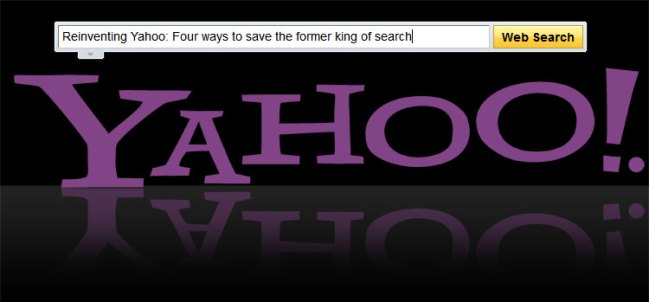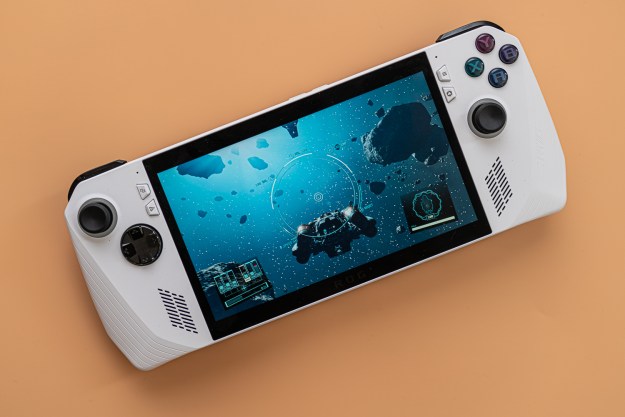
At the Web 2.0 Summit in November, Yahoo CEO Carol Bartz admitted it took her awhile to define her own company. “Content, communications, media, technology, that’s Yahoo.” And it’s also in the midst of a Silicon Valley identity crisis so severe, many doubt the company’s ability to make it out alive.
Yahoo needs to pick its areas of focus and stick to them. Gone are the days when it can parade around like Google, investing in various applications and trying to offer users the whole package. It tried that. Had recent financial events and a little thing called Facebook not exploded within the same span of years, Yahoo maybe could have played this game and been mildly successful. As it so happens, the former digital scion’s numbers began to tank with the recession and have yet to bounce back.
But there are some items on Yahoo’s agenda that could turn things around. Here are our picks for projects that can give Yahoo new legs to stand on.
 Embrace mobile platforms
Embrace mobile platforms
This is the biggie. With the explosion of smartphones and tablets in the last few years, and no end in sight, the mobile market is where any content provider needs to be. Up till very recently, Yahoo hadn’t made much of a play for these consumers. This week, however, the company announced it would be launching a tablet magazine called Livestand. The news aggregator will deliver customized content, a la Flipboard.
Yahoo shouldn’t singularly focus on providing content, though: It should also give users a way to produce it via mobile devices. Instagram and PicPlz are very ably dominating the photo sharing market, which is where Flickr comes in. Yahoo recently reaffirmed its commitment to the photo sharing platform, despite its slipping traffic numbers. Flickr is losing out to Facebook’s photo application (which hardly any entity can compete with, honestly), as well as photo apps whose popularity is surging ahead, thanks largely to the unstoppable smartphone market. Yahoo desperately needs to work on integrating Flickr more thoroughly with these devices. Yahoo was reportedly working on weaving Flickr into the native mobile experience as early as 2006, but internal issues detracted from the project and it fizzled. A former Flickr engineer even admitted on a Quora posting that “we fell into a trap of thinking like an incumbent.”
According to recent reports, fortunately, this is a piece of Yahoo’s future plans for Flickr.
Search no more
It’s no secret that Yahoo’s search platform is weak. It’s already powering its Web, image, and video searches with Bing’s technology, whose own search platform is steadily gaining as Yahoo’s steadily declines. Bing, of course, also receives 12 percent of Yahoo’s search revenues. Could it possibly be time to abandon one of its original functions, or at least entirely cede its service to Bing? Bartz herself has said that when Yahoo tried to identify itself as a search platform, it lost direction. Under former CEO Jerry Yang, search was a priority, as was staying competitive with Google Search, which has obviously been a losing battle.
Instead, Yahoo could take what it’s investing in search and put that time and money into its e-mail and chat clients, vital pieces that retain most of its user base. By promoting them it can rebuild its reputation as a reliable communication tool.
Putting Web properties on the chopping block isn’t a popular decision; it makes the company look weak and puts mass amounts of people out of jobs. But Yahoo has squandered its mergers and acquisitions in the last few years, and obviously been spreading itself too thin. Clearly, some big things are going to have to go. Remember the Peanut Butter Manifesto that leaked back in 2006? It became so clear then that Yahoo was trying to cover too much ground without pouring itself into a legitimately good product.
 Go local
Go local
At least Yahoo’s been trying in this department. Earlier this year, before Groupon had even had the chance to reject Google’s $6 billion acquisition offer, Yahoo was the one trying to scoop up the daily deals site. While the deal never came to fruition, at least it was clearly on the right track.
The acquisition fell through but Yahoo has been partnering with Groupon to offer the site’s coupon to Yahoo users, which is a good start, but it needs to up the ante. LivingSocial’s business has been booming lately, and were Yahoo willing to pony up some big numbers, it could possibly buy the company and power its own local offers platform. If that just isn’t in the cards – which is very possibly the case, seeing as LivingSocial has been raking in investments – Yahoo should expand its local department, with a fully-featured application (which could also spill over into its mobile initiative with check-in and coupon unlocking features).
Yahoo TV
Yahoo’s go at Internet TV is getting a lot of praise, especially since showing at CES earlier this year. Internet TV undoubtedly has some barriers to overcome before it’s a verifiable hit with consumers, and companies like Google and Apple have both struggled with their own connected television products. Yahoo’s own product, which partners with Samsung, differs in that in place of a full browser, users can access Internet content via downloadable widgets.
We say keep the widgets and add a browser. If consumers don’t use it, at least it’s there as an option for those who simply want the choice. Despite sluggish sales and disputes with providers, polls have shown that connected TVs that also offer social aspects to the viewing experience are only becoming more popular with consumers, and Yahoo’s device is one of the best in adding these elements. One of the features it will add to its Internet TV this year is “broadcast interactivity,” which offers content that engages users (surveys, polls, shopping) during a regular broadcast.
Yahoo has a true competitor that could actually pull ahead in this arena, but it hasn’t received much attention. It seems like Yahoo’s being somewhat cautious, but it should take on chance on this one – it’s time to get ambitious about a project, and this one has some good buzz surrounding it.




